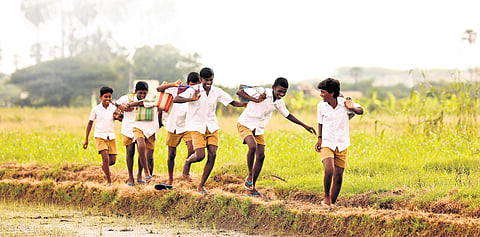'Vaazhai' movie review: Mari Selvaraj’s most tender and affecting tale yet
Sometimes you look forward to watching a film and then when it finally arrives, you are left with little to no emotions to speak about it. And then when the climax unfolds, you just want to quickly pick up every visual and thought, and hold it together in memory for as long as possible. Director Mari Selvaraj, who has a knack for arresting his audience with deeply personal and affecting stories, has pulled out a page from his life with Vaazhai, a film so tender that it tugs at your heartstrings and then uproots it all at once.
Within the first fifteen minutes of Vaazhai, Mari Selvaraj sets the stage for how his story will pan out. An old man in Puliyankulam village dies and the whole area gathers for his funeral. Sivanaindhan (Ponvel) is woken up by his sister Vembu (Dhivya Duraisamy) that morning. When he protests, she tells him that they don’t have to carry banana stalks since they have a funeral to attend. Later, Sivanaindhan innocently tells his friend, “Naalikum yaarachu setha nalla irukum (It would be nice if someone dies tomorrow as well).”
Of course, Sivanaindhan doesn’t understand the gravity of his words, nor does he feel the weight of it. And the film too traverses along with his innocence as he and his closest pal Sekar (Raghul) move through each day in school figuring out if actor Rajinikanth is the bigger star or Kamal Haasan is. When they are not engaged in fan wars, they are gushing over their teacher Poongodi (Nikhila Vimal). If it was Jo (Anandhi) in Pariyerum Perumal who was Pari’s angel, Poongodi is Sivanaindhan’s angel, his respite when things go awry. She can teach him dance moves, sew his shirt and even offer him her handkerchief as a memory. Sadly, that’s all she could do as an elite who remains distant as ever to the oppressed and their dreams.
The theatre erupted in laughter every time Sivanaindhan and Sekar’s mischievous acts played out on screen. Their chalk-and-cheese love story is a delight to watch. But all those moments die down when the director paints a no-holds-barred reality of the workers. It is gruelling and every little joy is sucked out of their lives before they could earn a penny, but perhaps the best line that summarises their agony is when a villager points out to the buyer that he has been working in the same field since the latter’s father was a buyer.
The filmmaker doesn’t stop there. Kani (an aptly-cast Kalaiyarasan) stands as a leader and a rebel with a cause who believes in the dignity of labour. Sivanaindhan’s mother (Janaki) fights for her family’s respect to be protected at all costs. And when the film gets too heavy, Sivanaindhan brings in marudaani plants (henna) as a truce and to forge love. I grinned from ear to ear when Kani and Vembu wore marudaani on their hands and lovingly showed it to each other.
While several of these ideas piece the puzzle quite well, the characters could have stayed with us for a bit longer. For example, we know little about Vembu other than as a doting sister and a coy lover. Similarly, we would have loved to see more about Sivanaindhan’s mother’s communist values and Kani’s story behind his rebellious self.
Mari and cinematographer Theni Eswar present these ideas in a visual grammar that is both visceral and evocative. Among these images are that of Sivanaindhan just running several miles on foot, chased by the trauma that he has endured, the agony that the ghosts of his past have left for him and the scars that he has to carry forward for the rest of his life.
The banana plant is renowned for its all-round utility, from stem to leaf. Yet, when one plant dies after fruiting, its offshoots continue to grow—a symbol of prosperity. Vaazhai beautifully captures the inherent irony of how the underprivileged are doomed to be exploited and traumatised even at the hands of a symbol of prosperity.
Director: Mari Selvaraj
Cast: Ponvel M, Raghul R, Kalaiyarasan, Nikhila Vimal, J Sathish Kumar, Dhivya Duraisamy, Janaki

